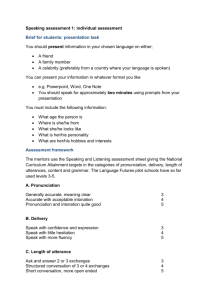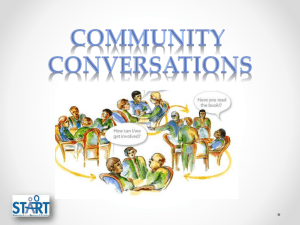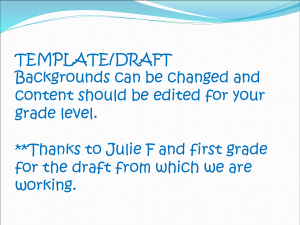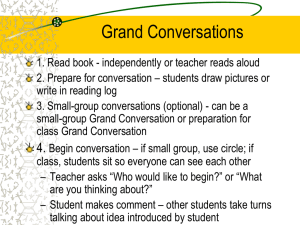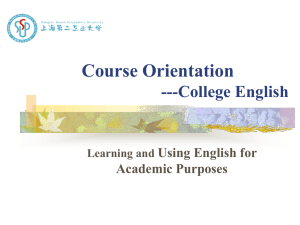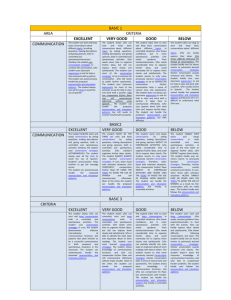SP-curric-overview
advertisement
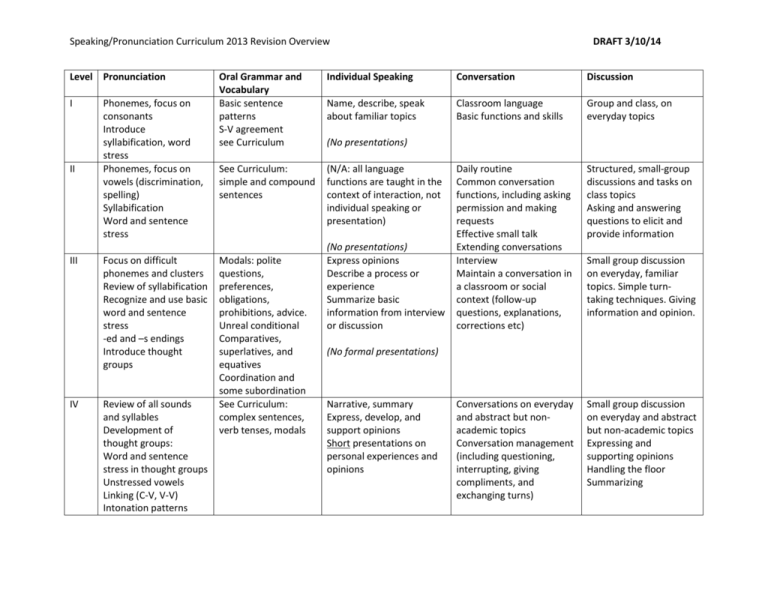
Speaking/Pronunciation Curriculum 2013 Revision Overview Level Pronunciation I II III IV Phonemes, focus on consonants Introduce syllabification, word stress Phonemes, focus on vowels (discrimination, spelling) Syllabification Word and sentence stress Focus on difficult phonemes and clusters Review of syllabification Recognize and use basic word and sentence stress -ed and –s endings Introduce thought groups Review of all sounds and syllables Development of thought groups: Word and sentence stress in thought groups Unstressed vowels Linking (C-V, V-V) Intonation patterns DRAFT 3/10/14 Oral Grammar and Vocabulary Basic sentence patterns S-V agreement see Curriculum Individual Speaking Conversation Discussion Name, describe, speak about familiar topics Classroom language Basic functions and skills Group and class, on everyday topics See Curriculum: simple and compound sentences (N/A: all language functions are taught in the context of interaction, not individual speaking or presentation) Daily routine Common conversation functions, including asking permission and making requests Effective small talk Extending conversations Interview Maintain a conversation in a classroom or social context (follow-up questions, explanations, corrections etc) Structured, small-group discussions and tasks on class topics Asking and answering questions to elicit and provide information Conversations on everyday and abstract but nonacademic topics Conversation management (including questioning, interrupting, giving compliments, and exchanging turns) Small group discussion on everyday and abstract but non-academic topics Expressing and supporting opinions Handling the floor Summarizing Modals: polite questions, preferences, obligations, prohibitions, advice. Unreal conditional Comparatives, superlatives, and equatives Coordination and some subordination See Curriculum: complex sentences, verb tenses, modals (No presentations) (No presentations) Express opinions Describe a process or experience Summarize basic information from interview or discussion Small group discussion on everyday, familiar topics. Simple turntaking techniques. Giving information and opinion. (No formal presentations) Narrative, summary Express, develop, and support opinions Short presentations on personal experiences and opinions Speaking/Pronunciation Curriculum 2013 Revision Overview DRAFT 3/10/14 V Linking and reductions in words and thought groups Patterns of intonation in thought groups and sentences (questions, lists, highlighting information, etc.) Review and expansion of word stress Use of subordination, relative and noun clauses, range of verb tense; passive voice Paraphrase and summarize main ideas from conversations, recordings, events, texts EAP: indiv and group presentations on academic topics based on experience and limited research General: group performances Sustained conversation on everyday topics; developing competence in abstract topics. Asking follow-up, clarification, and elaboration questions. VI Linking, blending, and reduction Review and expansion of intonation (intelligibility, attitude, emotion, emphasis) EAP: Pronunciation of academic vocabulary Reduced clauses and other subordination Word order, questions S/V and P/A agreement Passive voice Connectors Paraphrase and summarize ideas and details from conversations, recordings, events, [academic] texts, and [academic] lectures Presentations (indiv and group) based on research EAP: Graphs and tables; use of visual aids General: Individual and group performances Formal and informal conversations and service encounters EAP: office hours Polite interactions (including arrangements, complaints) Small group and class discussions on familiar and unfamiliar topics [EAP: and basic academic topics] Clarification, restatement, paraphrase, examples, illustrations. Work with a group to develop a short project, presentation, or performance Active participation [in academic discussions and seminars based on listening and reading] Effective leadership Personal, abstract, and academic topics Work with a group (or class) to develop a substantial project, presentation, or performance
